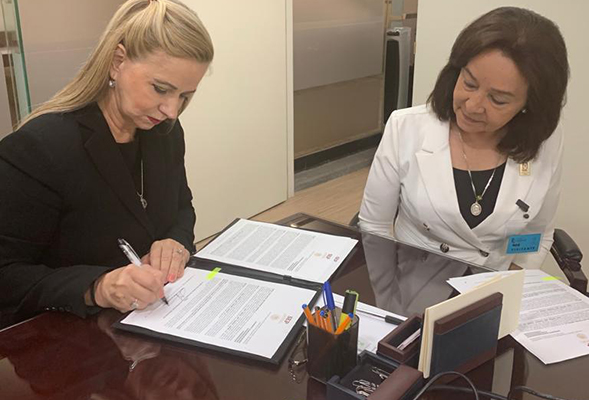Teacher Assessment Tools Accepted for Mexico Schools
Developed at SDSU Imperial Valley, an electronic system to assess the English proficiency of schoolteachers has been accredited for use throughout the country.

Instruments developed at SDSU Imperial Valley to assess the English language proficiency of teachers in Mexico have been accredited for use throughout the nation’s public and private schools, a recognition achieved after seven years of work.
The ability to teach in English has been an increasingly important priority for the national government of Mexico, said Suzanna Fuentes, director of SDSU Imperial Valley’s Professional Skills Development Center, who advanced the accreditation effort.
The electronic assessment tools developed at the center, Fuentes said, measure various components of grammar, reading comprehension, listening comprehension, writing and speaking required of all teachers in Mexico to see how well they meet the schools’ high criteria for English proficiency.
The accreditation by Mexico’s Ministry of Public Education makes SDSU currently the only U.S. university with the government accreditation, a status shared with the University of Cambridge and the University of Oxford in the United Kingdom. Only 23 institutions worldwide, mostly in Mexico, have been accredited for the tools they have developed to perform the proficiency assessment.
“It took us about seven years to be accredited because we had to go through a lot of committees,” Fuentes said. “We had to consult experts in Mexico—a lot of them.”
The accreditation comes under Mexico’s National Language Level Certification (CENNI) program and was made official at a signing in April in Mexico City.
SDSU Imperial Valley Dean Gregorio Ponce said the accreditation will open doors for SDSU’s educational expertise throughout Mexico. “Rather than the university trying to establish relationships one to one, this becomes a calling card” to all regions, Ponce said.
Fuentes said SDSU’s assessment tools also are in use in Central and Latin America, and that the center hopes to draw interest from Spain as well. In Mexico, she said, the accreditation “is the beginning of many possible educational projects and other types of assessments. This is like a springboard to a lot of binational possibilities.”



